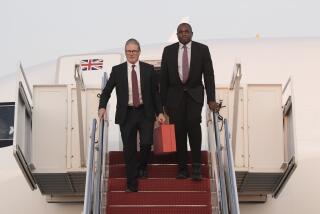Kremlin Awaits Green Light on Weapons Talks : Baker Due in Moscow Today to Outline U.S. Views on Major Issues
- Share via
MOSCOW — Impatient over the Bush Administration’s lengthy foreign policy review, the Soviet Union hopes to hear from Secretary of State James A. Baker III today that Washington is ready to resume negotiations on reducing the two countries’ strategic arsenals and to respond to recent Soviet proposals on other disarmament measures.
Baker, who is to arrive in Moscow today for meetings with President Mikhail S. Gorbachev and Foreign Minister Eduard A. Shevardnadze, will outline the new Administration’s thinking on a wide range of international and bilateral issues, according to senior U.S. diplomats here. What interests Moscow most is the Bush Administration’s approach to the Strategic Arms Reduction Talks, which were recessed six months ago at U.S. request. To the Kremlin, these talks are the touchstone of Soviet-American relations by which other issues and the relationship as a whole are tested.
Early Talks Favored
“The Soviet Union has favored and continues to favor an early resumption of talks on nuclear and space weapons,” Alexei A. Obukhov, head of the Foreign Ministry’s U.S. affairs department and a top Soviet arms negotiator, commented in advance of the Baker trip. “Much has been achieved in this sphere, draft documents have been prepared and, if the sides are ready for it, the talks could be completed rather quickly.
“The Soviet side is willing to work for achieving positive and quick results. All depends on the way Washington is preparing for the talks.”
Expecting Baker to propose resumption of the strategic arms talks in June after the lengthy pause for the U.S. reassessment, the Soviet leaders plan to suggest more intensive, faster-paced negotiations in the hope of regaining lost momentum and reaching an agreement this year, according to informed Soviet sources.
But Moscow also realizes, these sources said, that recent decisions by the Bush Administration on the next generation of U.S. land-based intercontinental missiles, including development of both the Midgetman and the MX, will mean changes in Washington’s negotiating position and consequently will lengthen the talks.
“We would like to get a clear exposition of the U.S. position on strategic arms reduction from Secretary Baker,” a senior Soviet official remarked last week, “but apparently we will get only an outline from him and have to await specific proposals when the negotiations resume in Geneva. Frankly, we wish the new Administration had got itself together a little better and a little faster than it has.”
Soviet officials have made it clear that Baker’s presentation will be closely studied, both for changes from Reagan Administration policies, particularly on disarmament and on the overall approach to Soviet-American relations, and for the speed with which President Bush wants to develop the relationship.
Obukhov, noting that Soviet-American relations have been on a plateau for much of the last year because of the U.S. presidential election, the transition from one administration to the other and then the Bush Administration’s policy review, told the official news agency Tass:
“The new U.S Administration paused to analyze foreign policy priorities, and that is quite normal. Now it is necessary to step up the negotiating process in all spheres, and I hope that Baker’s visit will lead to it.”
Bush and Gorbachev agreed at their meeting in New York in December on the need for continuity in Soviet-American relations, Obukhov said, adding: “We should now move forward guided by this principle, and we should give it concrete significance.”
But recent hard-line comments by Defense Secretary Dick Cheney, as well as those of some presidential advisers, have raised serious questions in the minds of Soviet specialists on American affairs about the direction of U.S. policy.
Commentator Alexander I. Bovin, writing in the government newspaper Izvestia, observed that the Bush Administration seems to have less enthusiasm for closer ties with the Soviet Union. He expressed Moscow’s apprehension that Washington is, as other foreign affairs specialists have put it, “cooling,” “stalling” or “limiting” Soviet-American relations.
Policy Reassessment
These Soviet concerns stem not only from the lengthy policy reassessment ordered by Bush but also from what Moscow took as a proliferation of signs that Washington’s approach to superpower relations was changing.
“When Dick Cheney said not once, not twice, not three times but at least five times that Mikhail Gorbachev is going to fail, that perestroika (Gorbachev’s reform program) is doomed, that someone ‘far more hostile’ will then come to the fore, what he was saying was, ‘Don’t, don’t, don’t negotiate,’ ” a top Soviet foreign policy analyst commented.
“The only, the only--and I repeat--the only interpretation of Cheney’s comments is that the U.S. military and the U.S. conservative Establishment from which he comes is going to fight every advance in Soviet-American relations, in disarmament, in the reduction of international tensions, and that in Bush they have a sympathetic ear.
“Worse than that is the very real possibility that Cheney’s cries will become one of those self-fulfilling prophecies in which we fail because we were cursed with failure from the beginning. . . . In short, why make concessions to a loser like Mikhail Gorbachev? And when he is beset by his opponents, you can say, ‘See--a loser, just like we said.’ ”
More to Read
Sign up for Essential California
The most important California stories and recommendations in your inbox every morning.
You may occasionally receive promotional content from the Los Angeles Times.













